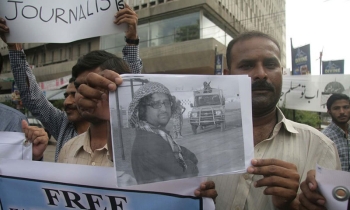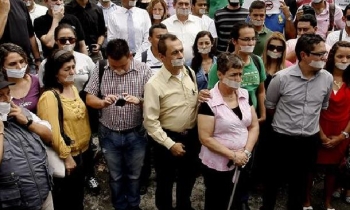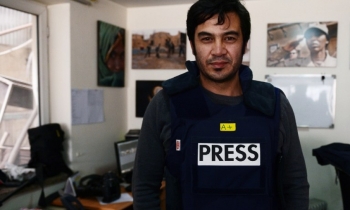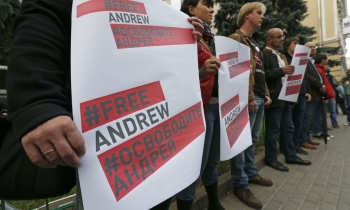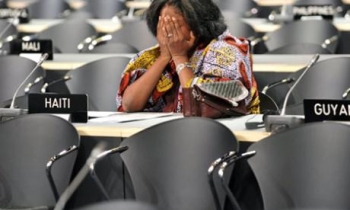Naxalite activities are making the Chhattisgarh government see red everywhere. Pushed on the backfoot over increased Maoist violence in the state, the government has decided one of the ways to control ultra-Left insurgency is by training its guns on the press.

The state Assembly has passed a controversial Bill, barring the media from carrying reports of any kind of 'unlawful activities' (read Naxal/Maoist violence) in the state, the Times of India reported last week. It can become law only after Presidential assent. The Bill has been couched in words that say the step has been taken to "safeguard people's lives and property and to maintain public order, peace and tranquillity." It warns violators of prosecution under the Chhattisgargh Special Public Security Act (CSPSA).
Expressing alarm at the move of the Chhattisgarh government, the International Federation of Journalists (IFJ) has appealed to the President not to give his assent to "this undemocratic legislation, and initiate public debate on the complex causes of conflict, rather than treat it as a law and order problem."
IFJ President Christopher Warren, in a statement, said, "Freedom of the press is a pre-requisite for the peaceful resolution of conflict, and restricting the media from carrying out its professional activities can only lead to more suspicion and misinformation. Under no circumstances has gagging the media and silencing journalists furthered the objective of tackling armed conflict. It is only when democratic debate and the free flow of accurate information is made possible is the cause of democracy furthered."
The Commonwealth Human Rights Initiative (CHRI) has expressed its reservations about the proposed Act, and said it may become a potential instrument to throttle the
right to free speech, legitimate dissent, and trample the fundamental rights enshrined in Articles 14, 19 and 21 of the Constitution.
CHRI, in a statement, said that the present definition of "unlawful activities" imperils free exercise of fundamental freedoms set out under Article 19 of the Constitution and illustratively it appears to restrict the right to hold public meetings; organise public protests; and oppose government policies through the media.
The Bill was rushed through in the winter session of the assembly, which concluded on December 23. When the Bill was being debated in the assembly, the opposition Congress was out of the House protesting against the government's agricultural policies and no public announcement of the Bill was made. According to Section 2E of the Bill, visible representation or ''words either spoken or written'' in relation to banned organisations would be deemed unlawful activity.

Any action taken under the proposed Act by the government or the district magistrate or any other officer authorised by the government shall not be challenged in any court ''in a suit, proceeding, application or by way of appeal or revision and no injunction shall be granted by any court or any other authority in respect or an action taken or to be taken in pursuance of any power conferred under the proposed Act.''
The proposed Act prescribes punishment of up to two years imprisonment for making a contribution to an unlawful organisation or for protecting a member of an unlawful organisation. "There is a real danger that blanket application of this provision may result in undue harassment of persons coerced by insurgent groups to provide sustenance and shelter to them," Warren warned.
Reporting on Maoist activities in the state is hazardsome for journalists. Last month, Kamlesh Paikra, the Bijapur correspondent of Hindsatt in Dantewada district, lost his job and was forced to flee his home, after being harassed for months by the police and Salwa Judum activists because of his reporting on the Maoist guerrillas.
Paikra, 27, and his family had been the target of all-out harassment since April 2005. Members of the anti-Maoist Salwa Judum ransacked his home because of the many articles he wrote about the activities of the Maoist rebels. Several police officers, including DL Marhar of Bijapur, tried to coerce him to reveal his sources. The threats became more frequent and pronounced after he refused to comply.
"It is absolutely shameful the way some authorities hound journalists trying to cover the chaotic reality prevailing in several regions of India," Reporters sans Frontières (RSF) said. "We call on the Chhattisgarh state government to protect journalists and guarantee the right to inform. The New Delhi government must also intervene to ensure that the rights of reporters are respected in this region."
The police and Salwa Judum had been monitoring his activities closely since September 2005 after he reported on the burning of houses by Salwa Judum activists. At the same time, the state government refused to issue him a permit for a fair price shop, which he needed in order to take up a second trade because his correspondent's pay was not enough to cover his family's needs.

Paikra received a death threat in December after helping a delegation of politicians visit a village destroyed by Salwa Judum cadres. His brother, a headmaster in a village school, was meanwhile detained for two weeks for possession of Naxalite literature. He fled from Bijapur with his family in the third week of December after coming to know that the police was planning to "eliminate" him through an encounter.
"Intimidation of journalists and preventing them from carrying out their profession is unacceptable under any circumstances, but when reporting on conflict, journalists are already in a precarious position between combatant parties. Only when they are allowed to report independently and without fear, can a genuine democracy be said to be in place," said IFJ president Christopher Warren after Paikra's plight was reported.
The Chattisgarh Shramjivi Patrakar Sangh (Chattisgarh Working Journalists Union), appealed to Chattisgarh Chief Minister Raman Singh and Governor Lt Gen KM Seth to provide security to enable Paikra to return to Bijapur. The plea fell on deaf ears.
Another Bijapur-based journalist, Lakshman Singh Kusram, was threatened by the police in early January 2006 after reporting in a local publication that women had been beaten by the police.
Several senior politicians in Chhattisgarh threatened to arrest journalists or close down their media last year for interviewing Maoists. Baliram Kashyap, a member of parliament of the ruling Bharatiya Janata Party (BJP), caused an outcry by telling a local newspaper on September 1, 2005 that journalists who "glorified Maoists" should be killed.

